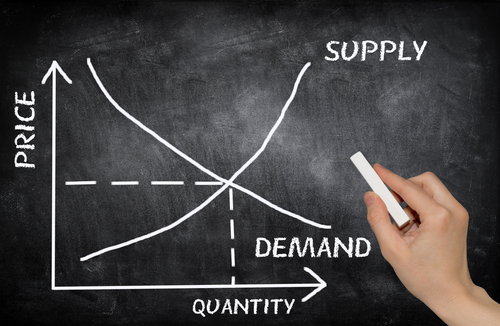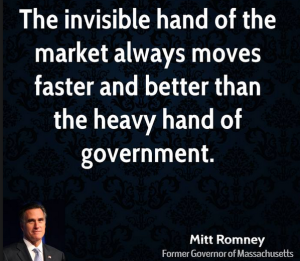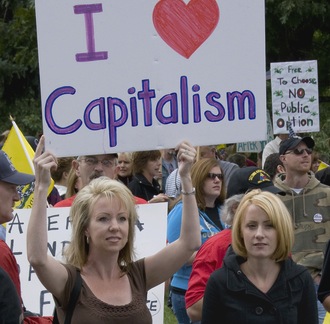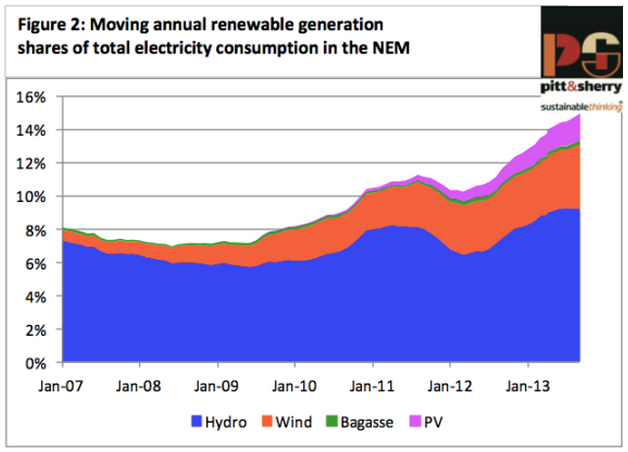
Raise your hand if this has ever happened to you. You’re telling someone about some problem the world is facing, whether it’s global warming, animal cruelty in factory farms, sweatshop labor conditions, polluted rivers, e-waste, or some public health epidemic like diabetes, heart disease, cancer or obesity. In your mind, it’s clear as day: the cause is corporate responsibility (or lack thereof), and the repercussions are huge…nothing short of the end of humanity as we know it. And yet, the person you’re talking to looks either bored, or like they’d rather be chewing on tin foil while listening to a cheese grater rubbed down a chalkboard.
“Don’t worry about it,” they say. “The invisible hand of the market will make things right. You just have to vote with your dollars and support the kinds of products and services that will help make the world a better place.”
You could be forgiven for being so flabbergasted as to not having a response to this. Once someone has set their intention to focus only on their own well-being, there’s not much you can do to communicate with them about the things that are tearing society apart or make them care (until it affects them personally, that is, and then they care like crazy). There are, in fact, whole groups that proudly don’t give a sh*t about the world around them. Google the Ainokea and “Rolling Coal” movements, if you don’t believe me.
The theory of the invisible hand is often touted by those who’d rather not face the world’s problems as the only real ‘solution’ to those problems.
The invisible hand….
The theory of the invisible hand is credited to 18th century economist Adam Smith. Smith wrote a book called The Wealth of Nations, in which he described the free market as a guiding force for creating the kind of society we want. The theory, in short, is this: when you spend a dollar, businesses will follow that dollar, and create the kinds of goods and services that will earn them those dollars. Thus, if we all want to live in a world free of GMOs, we’d never buy GMO foods. If we want 100% renewable energy, we’ll all go solar or buy an energy efficiency franchise business. The free market will do the rest–GMO/pesticide companies would shift their focus into organics, fossil fuel companies into renewables, and so on. Problem…solved.

Like many theories, it sounds great! And it is so often trumpeted by conservatives around the world as a reason why regulations should be cut back and eliminated, as regulations are, effectively, the government trying to tell the market what to do, rather than simply allowing the free market to create a better world for us.
See? Here’s the latest Republican nominee for the Presidency, the latest in a long line echoing the sentiment.
….never picks up the check
The problem is that, like most theories, sounding good doesn’t meet the test of reality. The invisible hand has this knack…it’s like your friend with alligator arms. When you’re done with a big group meal and the bill comes, their hand goes ever so slightly toward it, just enough to convince people the intention is there, but [argh] it’s so [grunt] far away…
And that’s the fundamental challenge in the Invisible Hand theory. A company can produce a shiny new tablet every year, at a reasonable price, that’s 100% recyclable and not going to contribute to the global e-waste problem, make sure that it’s got no toxic components, that the workers were paid fairly, that the working conditions in the factories were safe and that the pollutants from electronics manufacturing were disposed of properly, created using 100% renewable energy and that it’s packaged in compostable or recyclable packaging. And people would buy it. A virtuous cycle.
But if there’s no regulations against another company reducing its costs by doing none of these things (except producing the tablet), then this second company can come in cheaper at the point of purchase. As a consumer, then, you’re faced with a choice–spend a few hundred more to make sure that the world doesn’t get f*cked, or spend a few hundred less and put that money in your pocket (and let the world pick up the tab for the rest).
The Invisible Hand theory only works if all the companies in the world are playing on the same playing field by the same rules. Allow one company to employ sweatshop labor conditions or use the cheapest/most toxic ingredients, and they all must follow suit, or risk being the high price option that only a few can afford or will voluntarily buy.
So why is this still a thing?
It’s so clear that the Invisible Hand will never pick up the check. It doesn’t matter if it’s global warming, electronic or e-waste, antibiotic resistant bacteria (“superbugs”) caused by factory farms’ indiscriminate use of antibiotics, bee colony collapse disorder caused by pesticide drift, obesity, diabetes, cancer, heart disease, or any other set of costs borne by society (and thus, not by the companies that created them). There is no economic incentive strong enough to support the theory of the Invisible Hand to actually shift markets. Yes, many of us do vote with our dollars. But not enough…so long as the Wal-Marts of the world continue to force the lowest common denominator to be price price price, people without disposable income will never be able to vote with their dollars, thus making the theory nothing more than that–a theory.
There are three primary failures of most free market theories: externalities, tragedy of the commons, and information asymmetry. The great irony of modern conservatives is that Adam Smith, the man they cherish, adore, and idolize, talked about all these things in his book and other writings. He was clear on the concept that the theory of the Invisible Hand would not work if companies were able to externalize their costs by dumping on society. But yet…it’s still bandied about as if it was solid as a rock, and informs conservative policy creation to this day. Why?
The answer is simple. It’s a convenient excuse to do nothing. And that’s what I would say about the “drill-baby-drill” mentality that continues to push for the end of days (not to mention Keystone XL). These people, alongside the Rolling Coal and the Ainokea movements, are very selfish, and do very little beyond lip service to help the world. But you can’t win elections by saying, “Fellow Americans, let the companies make more money this year by putting their costs off onto you. It’s the American way.” A much better selling point is “let the invisible hand do its work, son…”
Photo from Shutterstock







